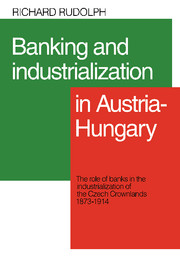 Banking and Industrialization in Austria-Hungary
Banking and Industrialization in Austria-Hungary Published online by Cambridge University Press: 05 January 2012
There can be no doubt that the financial intermediaries of Austria-Hungary were closely connected with industrial enterprises and the process of industrialization. As some contemporaries pointed out, the relationship between banks and industry was at times more intimate than that existing in Germany. Nevertheless, the view that the banks acted as promoters of industrialization at a certain stage of “relative backwardness,” or that they emulated the German universal banks, must be qualified to a very great degree. In certain very significant particulars, the bank–industry relationship differed a great deal from that in the German Empire; even more important, the relationship between banks and the industrial sector was not a stable one and changed throughout the period under discussion.
In the following sections, an attempt will be made to distinguish some of the major features of the financial system in its relationship to industrialization in the Czech Lands, particularly with a view to the degree to which the banks did or did not facilitate growth. Theoretically, the financial structure is in a position to facilitate economic growth through its role as a financial intermediary, interposing itself between and thereby separating the functions of savings and investment. The facilitating or accelerating role of financial institutions in industrialization would not exist if the following conditions held: (1) If all investors had the same ability to combine factors of production, to utilize assets at their disposal, and had the same view toward risk; (2) if there were no economies of scale within production units or externalities within an economy; and (3) if investments were not indivisible, i.e., if some production units did not require investments beyond the capabilities of their own ability to save.
To save this book to your Kindle, first ensure [email protected] is added to your Approved Personal Document E-mail List under your Personal Document Settings on the Manage Your Content and Devices page of your Amazon account. Then enter the ‘name’ part of your Kindle email address below. Find out more about saving to your Kindle.
Note you can select to save to either the @free.kindle.com or @kindle.com variations. ‘@free.kindle.com’ emails are free but can only be saved to your device when it is connected to wi-fi. ‘@kindle.com’ emails can be delivered even when you are not connected to wi-fi, but note that service fees apply.
Find out more about the Kindle Personal Document Service.
To save content items to your account, please confirm that you agree to abide by our usage policies. If this is the first time you use this feature, you will be asked to authorise Cambridge Core to connect with your account. Find out more about saving content to Dropbox.
To save content items to your account, please confirm that you agree to abide by our usage policies. If this is the first time you use this feature, you will be asked to authorise Cambridge Core to connect with your account. Find out more about saving content to Google Drive.